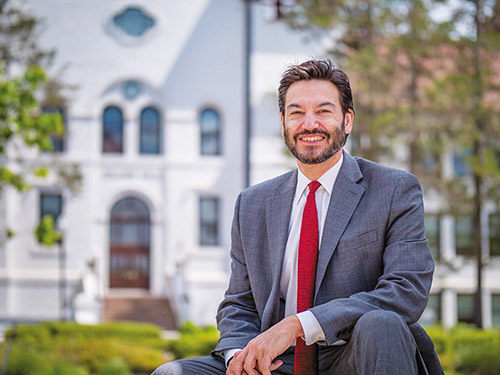
Dr. Jonathan Koppell has always felt universities should do more than just provide students with the ability to make a living in their chosen fields, and rather should arm them with the skills that will enable them to make a difference in a world beset with a growing list of problems.
That deep sense of tikkun olam, a Hebrew phrase translated as an individual’s responsibility toward “repairing the world,” was instilled in him by his father, G. Oliver Koppell—a former New York State attorney general, state assemblyman and New York City Council member—and mother, Kathleen Sunshine, a former dean and professor at Ramapo College in Mahwah, New Jersey.
“The value that your life should have meaning in terms of how you make contributions to the world is consistent with Judaism as I’ve been taught to understand it,” said Koppell in a phone interview.
Koppell, who became president of Montclair State University (MSU) on August 2, is now bringing that sense of repairing the world to New Jersey.
“I think Montclair State University is exactly the kind of university that is important in the world today,” said Koppell. “It’s a high-quality university accessible to a broad swath of society and is creating educational opportunities for everyone. We are not going to solve society’s problems if we create these educational opportunities for only a small swath of society.”
With more than 21,000 students, MSU is the state’s second-largest four-year institution and has earned a designation as a diverse public research university. It offers some 300 degree programs offered by 10 colleges.
Most recently, Koppell, a Bronx native, served as dean of the Arizona State University’s Watts College of Public Service and Community Solutions and held the Lattie and Elva Coor Presidential Chair in the School of Public Affairs. ASU has 125,000 students, which makes it one of the largest public universities, by enrollment, in the U.S.
Koppell, 51, said he was drawn to Montclair by its longtime commitment to “positive change in the community” dovetailing nicely into his commitment to inspiring students to seek such change by engaging in public service and “not just do great research and studying.”
“So this was actually a great fit,” he said.
Koppell downplayed the notion that today’s younger generation is less interested in the world than their parents or grandparents.“Today’s younger generation is very passionate about making a difference in the world,” he noted. “I think it’s a false narrative to say today’s young people are more interested in their phones than the world. I think that narrative is wrong and young people are very passionate about the world so we need to empower them to make change.”
The Watts College under Koppell promoted “use-inspired research” by faculty and research centers to make communities more prosperous, healthy and resilient. The college focused on unifying the specializations of its four schools of criminal justice, community development, public administration and policy and social work while connecting to a broad range of relevant ASU programs.
Koppell said he even got his rabbi at his former synagogue in Arizona engaged in the college’s initiatives and he hopes to engage with Jewish communities around his new hometown of Montclair in similar opportunities. Koppell became known as one of the most entrepreneurial leaders at ASU, adding more than 20 new degree programs at Watts, greatly expanding its online offerings and global programs, launching a unique joint college in China and creating the nation’s first public service academy. The majority of its students were from underrepresented minority communities, and nearly two-thirds were from lower-income families. Koppell said one of his goals is to prepare students from every major for lives dedicated to public service.
Creating Watts has been the “highlight” of Koppell’s career, as he watched “thousands of students earning degrees and improving their own lives while creating solutions from homelessness to domestic violence to health inequality.”
MSU, with its own commitment to encouraging public service already in place, “is the perfect university to carry this flag in New Jersey,” said Koppell.
Prior to joining ASU in 2010, Koppell was at the Yale School of Management, where he also directed the Millstein Center for Corporate Government and Performance.
“My joke has always been that I haven’t been terribly creative in my career,” he said. “My father was in politics and my mother was a higher education professor so I averaged my parents and became a college political science professor. But, I have a public service mindset about how to make a difference in the world that is consistent with the idea of tikkun olam and I think universities are incredibly powerful tools to make a difference in the world.”
A graduate of the Bronx High School of science and a lifelong Yankees fan, Koppell earned his bachelor’s degree at Harvard University and his doctorate in political science from the University of California at Berkeley. He is married to Jennifer Steen, with whom he has two high school-aged children.










